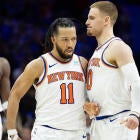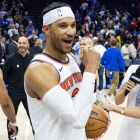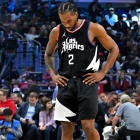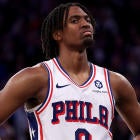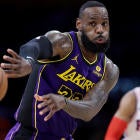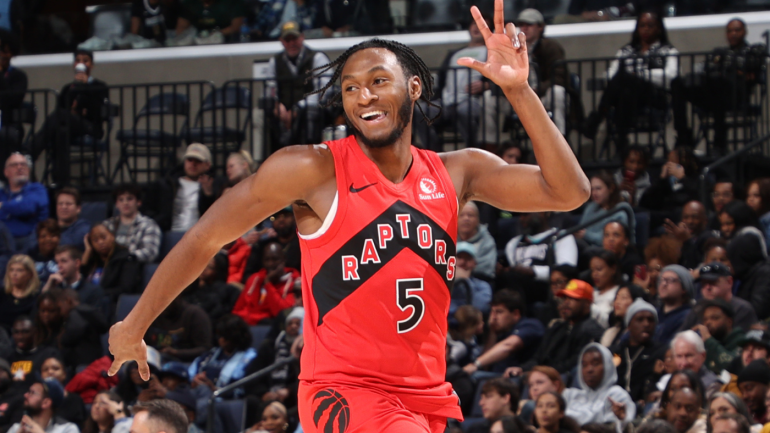
During a late-January practice, Toronto Raptors coach Darko Rajakovic asked the team a trivia question: Who's leading the NBA in above-the-break 3-point percentage?
The players gave him a few different names, but not the one Rajakovic was looking for. Among those who had attempted more than three above-the-break 3s per game, nobody had made a higher percentage than Raptors guard Immanuel Quickley's 45.8%.
Quickley, a 24-year-old breath of fresh air on a 17-32 team without title hopes in 2024, was acquired alongside RJ Barrett in the trade that sent OG Anunoby to the Knicks on New Year's Eve Eve. After years of trying to thread several needles -- win now without compromising the future, connect like-sized players with overlapping skill sets, score despite a severe shortage of spacing -- the Raptors made things simple. Scottie Barnes, their 22-year-old do-everything point forward ("our emerging superstar player," as veteran Thaddeus Young called him) is the center of their solar system. Quickley has star potential himself, and his game is a clean complement to Barnes' right now.
The day of the trade, Raptors president Masai Ujiri told Quickley on the phone to think about leadership, and about a team entering "a new phase, a new everything." Last season's runner-up for Sixth Man of the Year now has the ball in his hands from the opening tip, and, along with Barnes and Barrett, he represents the future of the franchise. He's not just in a different country; he's in a different world.
"It's an unbelievable fit with you and Scottie," Ujiri told him. "This is exactly what we wanted."
As a shooter, Quickley is the kind of weapon the team didn't have for the season's first two-plus months. This means his teammates need to free him up with screens and get him the ball when he's open. It also means he needs to let it fly, even though, as the full-time starting point guard for the first time in his professional career, he's responsible for getting his teammates going, too.
"I feel like that's something that I've done when I was younger, but when I was with the Knicks, when I was coming off the bench, really my job was just to score," Quickley said. "I was asked to just score. That was kind of how I stayed in the game, really, was just putting the ball in the basket."
Quickley clarified that he also needed to defend, given the particular priorities of Knicks coach Tom Thibodeau. But when the trade went down, he was effectively promoted to a job that isn't going to be vacant in New York for the foreseeable future. At the time of the trade, his numbers -- 22.5 points, 3.7 assists and 3.8 rebounds per 36 minutes; 58.8% true shooting percentage, 23.6% usage rate -- suggested he was vastly overqualified to be a backup. He was scoring slightly more than he did the previous season, despite averaging almost five fewer minutes. As a Raptor, Quickley's scoring has been closer to where it was in 2022-23 on a per-possession basis, but there has been a huge jump in assists.
"[It's one thing] to say, 'I want to be that guy,'" Rajakovic said, and another thing entirely to "know how to set up your teammates, but at the same time, be really aggressive."
The coach said this at Madison Square Garden on Jan. 20, shortly before Quickley chatted with Spike Lee courtside and received a rousing ovation during pregame introductions. Quickley finished his homecoming with 11 assists, but scored just 12 points and shot 1 for 2 from 3-point range. Two days later in Toronto, Rajakovic said he was pleased with the passing reads that Quickley made against blitzes. He also said that "we need to get him to take 8, 9, 10 3s a game."
.@IQ_GodSon FROM THE LOGO 👌 pic.twitter.com/i1tIYp1qxw
— Toronto Raptors (@Raptors) January 13, 2024
Quickley said he's "trying to find a balance" in his new role. It helps, though, that "coaches have been telling me to be myself and [saying] 'we'll adjust to you' and things like that."
Mere months ago, Tyrese Maxey of the Philadelphia 76ers gave similar answers to similar questions. Back in the summer of 2019, Quickley and Maxey were teammates at Kentucky, working out together at 6 a.m. four days a week. The 6-foot-2 guards were drafted four spots apart and started their NBA careers as change-of-pace reserves. Both their teams brought in high-usage, high-salaried, left-handed ballhandlers in 2022, and both continued to develop alongside them. Maxey is further along -- last Thursday, he dropped 51 points against the Jazz and was named an All-Star -- and didn't have to leave the team that drafted him to become a leading man, but the parallels are not lost on them.
"We talk about it a lot," Quickley said. "He was one of the first people to text me when I got traded, and he was just excited for me, that I was going to get a new opportunity to kind of be in a little bit of the same position that he was."
Last Friday in Houston, Quickley returned from a quad contusion to match up with ex-Raptors point guard Fred VanVleet, an admirer of the player who is now manning the position. "Watching him in college, I was a huge fan of him and Tyrese," VanVleet said. After seven years in Toronto, he was not shocked by his former team's change of direction, which continued when it traded Pascal Siakam to the Indiana Pacers in mid-January. When VanVleet met with Ujiri and general manager Bobby Webster in free agency, they were forthright.
"Just letting me know what the future was going to look like," VanVleet said. "And they eventually got to it. It took a little bit longer, but they eventually got to it. You gotta wait for the right moves and the right things to develop. But we all knew, watching Scottie at an early age, that at some point it's going to be his team."
Through this lens, "I thought it was a great trade," he said. "And Quick is just the kind of guard that they need." On the ball, Quickley is a threat from everywhere, and "he's so quick, no pun intended, but he's like a waterbug, and he's got that type of body that can draw fouls." Off the ball, he can space the floor, shoot off movement and create confusion as a screener.
"It's a perfect kind of two-man game they can play," VanVleet said. "Scottie can screen, Quick can screen, can slip out, obviously Scottie can pass. It's just two very complementary pieces. Great personalities in both -- I know IQ a little bit. And also the age thing: just perfect timelines."
Quickley is no longer sparking runs off the bench, but he's still extremely flammable. In Memphis for his second game with the Raptors, he didn't make a field goal until he swished a 3 off a dribble-handoff with Jakob Poeltl late in the second quarter. About a minute later, when the Grizzlies failed to pick him up in transition, he hit another one, prompting a timeout. The third quarter started with yet another Quickley 3 and one of his patented floaters, prompting another timeout. Quickley finished with 26 points and shot 5 for 8 from deep in the victory.
"The 3-point shooting, his dynamic ability to get into that midrange spot can really hurt you, you gotta show the appropriate crowds," Grizzlies coach Taylor Jenkins said weeks later in Toronto. "And you can't give him a window of opportunity to get a free look, which he got against us in [Memphis]. That really hurt us."
Immanuel Quickley vs Memphis Grizzlies
— A Walking Highlight (@11AWH) January 4, 2024
26 PTS
3 REB
5 AST
5/8 3P#WeTheNorth W pic.twitter.com/HQvKUEMh7t
Raptors guard Bruce Brown said Quickley is "hard to guard because you don't know what he's going to do, when he's going to pull up. The floater, obviously. He's got the pull-up 3 when he gets hot, and he can finish at the rim with the best of 'em." In the pick-and-roll with Barnes, "a 4 or a 5 could be guarding Scottie, or a big 3. They could mess up on switches, anything could happen. But he'll exploit the mismatch. And if they have a 5 [on Barnes] and they switch 1 through 5, he's going to destroy the 5."
Quickley's speed and shooting forces the defense to be on high alert. "Teams have to respect his shooting and how he comes off the screen and have to get over," Barnes said. To Quickley, running pick-and-rolls with Barnes is "quite similar" to running them with the Knicks' Julius Randle because of "the way that Scottie can score, the way he can finish around the rim." Quickley also knows he can find open 3s by screening for Barnes, like he used to do for Jalen Brunson. Their chemistry is "getting better each and every day," Quickley said, and he felt good about the fit from the beginning.
"I knew every time I looked at a stat sheet, [Barnes] was making 3s and things like that when I was on the Knicks," Quickley said. "So I knew he was really talented, could score, defend. And I knew it would be easy when I came over here because he's such a good player."
Quickley's shooting is "what we specifically needed," Toronto guard Garrett Temple said. Young said that "it's definitely a different feel" to have a ballhandler who can pull up from deep and draw two defenders to the ball.
"Now guys are hugging the 3-point line, and then the paint just opens up wide like the Red Sea," Young said. "So it gives you an opportunity to get downhill. Then once guys start saying, 'OK, now we gotta help into the paint,' then now those opportunities back at the 3-point line come in."
Rajakovic invoked the names of Stephen Curry and Damian Lillard when he said Quickley had to get more 3s up. "Their 3-point shooting and deep range, it just opens up so much," he said. The Raptors' have been emphasizing ball and player movement all season, but, without space, the pretty stuff won't pop. This is still a work in progress, and the roster may change again before this Thursday's trade deadline. The vision, however, is abundantly clear.
In the visitors' locker room at MSG, Temple lauded Quickley's efficiency and ability to score at all three levels. His floater "really is almost a fourth level," he said, right as the subject of conversation sat down one locker over. "But I don't want to talk too much about him 'cause he's next to me. So I ain't going to gas him up too much. We gotta go to chapel, he's gotta stay humble."
Temple was laughing, but Quickley replied straight-faced: "I'ma be humble, bro. I gotta keep working. I already know what it is I gotta do."
Two days later, after a rough loss to the undermanned Grizzlies at Scotiabank Arena -- "one of those nights you just want to flush down the toilet," Quickley said -- he sounded similarly steadfast. Before he was a Raptor, a Knick or a Wildcat, he was a kid taking piano lessons because his mother wanted him to. He played the saxophone for six years, too, and fell in love with playing drums. Nobody forced him into basketball -- in a 2020 story, The Athletic detailed the concerns of his father, who saw it as a road to perdition -- but he took to it because he kept improving. In high school, he got well acquainted with The Gun, a machine that rebounds your shots and fires the ball back out to you.
"I used to take thousands of shots on The Gun, and then in the game, I would make all my shots," he said.

Quickley is a man of faith -- in the religious sense, first and foremost, but also in that he believes hard work gets rewarded. "It always comes back around," he said. Quickley spent last offseason working on "pull-ups; being able to get other guys involved; knowing when to shoot, when to pass; the mindset to keep shooting when I miss," but all of it amounted to fine-tuning his game, which has grown leaps and bounds since he entered the league.
"Rookie Immanuel was just out there playing pickup," he said. "I was shooting floaters just any time I got the ball, just trying to figure out how to score. Now I'm kind of reading the game a little bit. Defensively I feel like I'm way better, and just understanding the game, understanding the season."
Quickley learned in New York that a playoff team, over the course of 82 games, can get trounced by 30-plus points or lose a few in a row. "There's a light at the end of the tunnel, even though it feels like, in the moment, that there is no way that the sun will come up tomorrow," he said. His first shooting slump was not the same as his fifth, and "the confidence piece is a big part of who I am."
Isaiah Hartenstein, his former Knicks teammate, said that Quickley "was always talented," but his work habits set him apart. Quickley is inquisitive, and he is a film junkie, which not only endeared him to Thibodeau but allowed him to recognize opponents' plays and put teammates in the right spots. "Even just little stuff -- you could see him reading books about the mental side of the game," Hartenstein said. The center no longer gets to show off his pick-and-roll chemistry with Quickley, but told him after the trade that he was "excited for him that he has a chance to lead a team."
Temple, who has played for 12 NBA teams in 15 seasons playing professional basketball, said that Quickley's maturity is rare. "Amazing guy," he said. "Really cerebral for his age. Really engaging. Thoughtful. Has a great joy about him. We have our love for Christ in common. Very talented. Has a work ethic, wants to get better, listens. I mean, it's everything you can ask out of a young guy." Quicklely's demeanor, combined with his ability, reminds Temple of only one former teammate: Bradley Beal. He ended an on-court workout last week by announcing, "Yeah, I got better today."
"It's all about opportunity and timing in the NBA," VanVleet said. "I think this is the time for IQ up there in Toronto. The city's going to love him. The country will love him. I know the management and staff and everybody, they'll gravitate towards him and grow to love him."
In the early days of the biggest opportunity of his career, Quickley is "not taking it for granted," he said. And he's not getting ahead of himself, either. His new coaches are holding him accountable on defense, which he wants, and he's "trying to be myself while still learning" the ins and outs of his new station. He believes that, as long as he puts "everything I have into each and every day," it will all fall into place.
For now, Quickley has to "be conscious of being aggressive, and kind of shot-hunting, because when I'm scoring, I feel like the defense has to blitz me and then I can get other guys involved," he said. In time, he won't need to worry about finding a balance between passing and scoring. In time, he trusts that he'll grow closer to his Raptors teammates and coaches, like he did with the Knicks, and he'll live his basketball life in read-and-react mode.
"I'm trying not to really think at all," Quickley said.














